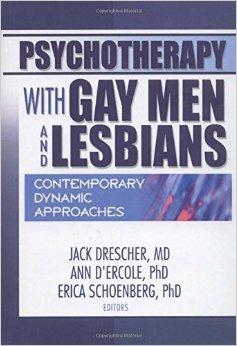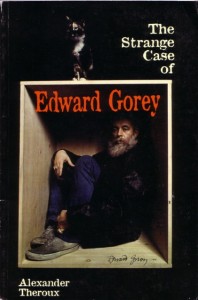 The Strange Case Of Edward Gorey
The Strange Case Of Edward Gorey
by Alexander Theroux
Fantagraphics Books. 68 pp., $8.95
Never before has there been a more felicitous outing than that of America’s quirkiest illustrator and author, Edward Gorey. This is a loving memoir of a singular artist, written by a best friend, Alexander Theroux, one of the most talented and least appreciated novelists in America. The outing of the elusive Mr. Gorey is of course not the book’s main purpose, which is to give us an intimate glimpse of Gorey of the kind that only a best friend could deliver. Actually, Theroux never says his subject is gay, but he piles on detail after unmistakable detail until the case is open-and-shut: Gorey adored George Balanchine and The Golden Girls; he taped episodes of Buffy the Vampire Slayer; he tramped the streets in full-length fur coats and tennis shoes. Beyond his indulgences in popular culture, Gorey had some very smart things to say about art, to wit: “[W]hat’s important is what’s left after you have explained everything else. Ideally, if anything were good, it would be indescribable. … That’s why I think Henry James is nonexistent. The longer he goes on, the more he explains, there is nothing left.” In addition to dozens of hilarious apothegms and episodes from his life, this book furnishes a summary of the entire Gorey oeuvre. Of his twenty or so books, The Hapless Child, which no publisher would initially touch, was his seminal one. Its heroine is a little girl of perfect virtue whose parents are knocked off in short order. Boarded away at school, her classmates dismember her favorite doll. She escapes, is sold into bondage and forced to make artificial flowers. One day her father, who isn’t dead after all, goes motoring and runs her down in the road. She is so changed that he fails to recognize the corpse. The end.
Alan Brady Conrath
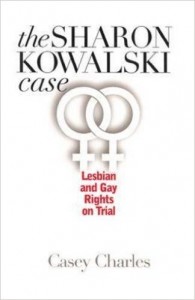 The Sharon Kowalski Case: Lesbian and Gay Rights on Trial
The Sharon Kowalski Case: Lesbian and Gay Rights on Trial
by Casey Charles
University Press of Kansas. 320 pp., $35.
It was anyone’s worst nightmare. On a fall day in 1983, after learning that her partner had been in a car accident, Karen Thompson stood separated from Sharon Kowalski by nothing more than a hospital door—a barrier Thompson had no legal right to cross. Kowalski’s parents, who simply could not believe their daughter was a lesbian, refused to grant any say over Sharon’s fate to a woman they regarded as her deranged and malicious “landlady.” The battle soon turned to the courts. Separated completely for more than three years, Thompson and Kowalski eventually won legal recognition in 1992 as a “family of affinity,” and live together to this day. In The Sharon Kowalski Case, Casey Charles provides a rich and gripping account of this courtroom drama and its implications for lesbian and gay rights. The decision in the Minnesota Court of Appeals is of little value as legal precedent; the true significance of the case was its hearing in the court of public opinion. Charles sets the case against the historical backdrop of the 1980’s, a time when AIDS had made the legal status of care-giving a hotly political issue, and before the changes in disability rights that followed the Americans with Disabilities Act in 1990. He reconstructs the case from trial transcripts, personal interviews, and Karen Thompson’s 1988 memoir (relying a little too much, and a little too uncritically, on the last of these sources). He exerts enough discipline over the endless maze of court hearings and legal motions to construct a compelling narrative while still allowing all the participants to speak for themselves. In debates about same-sex marriage, hospital visitation rights almost always come up, showing that Karen Thompson’s 1983 hospital-room nightmare continues to haunt any dream of full equality. The Sharon Kowalski Case shows how much has changed—and how much has not.
Christopher Capozzola
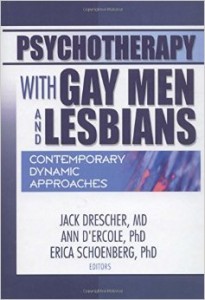 Psychotherapy with Gay Men and Lesbians:
Psychotherapy with Gay Men and Lesbians:
Contemporary Dynamic Approaches
Edited by Jack Drescher, M.D., Ann D’Ercole,
Ph.D., and Erica Schoenberg, Ph.D.
Haworth Press. 257 pp., $24.95 (paper)
While this book seems to be written for a specialty audience of psychoanalytically-oriented therapists, this collection of seventeen essays should appeal to anyone interested in gay liberation’s forgotten promise. All of the papers in the four sections (analyses of a case history; erotic transference and countertransference; gender and creativity; psychotherapy with people with HIV), illustrate how a gay-affirmative stance can effectively address the neglected problem of internalized homophobia, which slaughters gay love and potential within the existential gay mind. Drescher keeps the debate between social constructionism and essentialism alive by asking each contributor to explain where he or she stands on the issue. This becomes a fascinating exercise when contributors analyze Dr. Petros Levounis’s evocative case history of a typically shut down, intellectualizing, mother-dominated gay man named Stephen. The myopic limitations of the constructionist position—gayness is not essential and humans are inherently “fluid” or bisexual—are lushly exposed, at least to my somewhat biased essentialist perspective. Stephen is clearly and inherently gay. So Adria Shwartz’ jargonistic diagnosis of gay/lesbian as a “signifier” and a “reification” has no relevance to the actual treatment of what is simply deeply embedded toxic shame sourced in a lifetime of being misunderstood and abused by homophobic family values and culture. The more defiantly essentialist analyses, such as those from Kenneth Lewes, Florence Rosiello (she ain’t scared of erotic love between women) and especially co-editor Drescher are the more coherent, engaging and practical. Lewes explores the need to help free Stephen from the imprisoning “maternal matrix” and “lift massive phallic inhibition,” with Drescher all but demanding that the therapist do more to breathe appropriate therapeutic life into the gay eros engaging the therapy. It approaches the revolutionary, and even the “gay-centered,” to read about mainstream analysts propounding the mentoring power of gay love in this way, not to mention pushing hard the idea that therapists should rigorously confront their own homophobic demons.
Douglas Sadownick
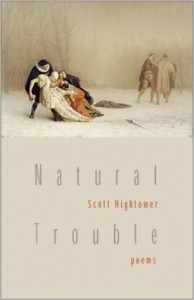 Natural Trouble
Natural Trouble
by Scott Hightower
Fordham University Press, 82 pp., $10.
Storyteller is not a sobriquet one often hears applied to contemporary poets, but the best poets can articulate the sense and semblance of a place or event with a few deft word choices and well-placed turns of phrases. Take Scott Hightower’s poem “Currency at the ‘Common Ground,’” a seemingly simple narrative poem that captures one brief moment in an upstate New York gay bar. The poem begins with a kiss—a stolen moment between the two lesbian proprietors of the bed and breakfast the narrator of the poem stays at—and ends the same way, at the close of a drag performance: “Bills rustle—some themselves offerings/ just taken by other performers;/ in turn, openly bestowed, along/ with the tuck of an acknowledging look,/ the genuine tribute of a modest kiss.” The simple gesture becomes paramount to the poet whose eye has caught the importance of this nonchalance. Such is the brilliance of Hightower’s poetry: simple words and everyday experiences combine with the author’s innate ability to choose just the right word and right experience to document. Natural Trouble, which follows Hightower’s excellent debut collection Tin Can Tourist, offers poetry that is both comforting and transcendent, a rare combination that leaves the reader both breathless and warmed by the experience. His narrative lyrics set to the page those small but important moments that occur in all our lives, and weave in larger ideas about time, biography, and one’s place in the grander scheme of things.
Michael G. Cornelius


